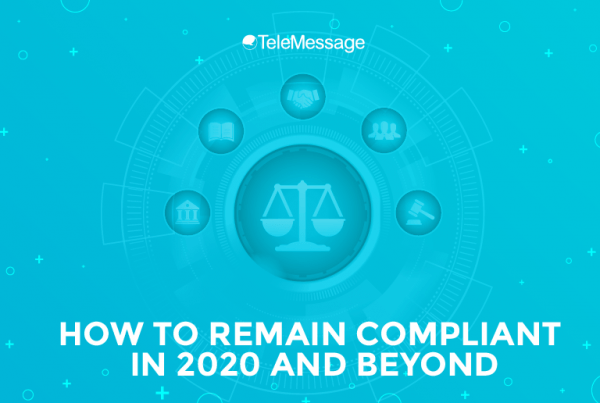Many regulated sectors around the world see increasing use of mobile devices as companies and organizations in financial services, healthcare, education, and the government use mobile messaging for communications. North America, Europe, and several Asian countries are using WhatsApp in growing numbers for official business communications.
The mobile phone recording requirements in Singapore are implemented by the Monetary Authority of Singapore or MAS and the Singapore Exchange or SGX. Singaporean companies using WhatsApp for mobile communications with Singapore MAS archiving regulations to continue their operations while avoiding hefty fines. It’s essential to set up operative messaging policies to ensure that all of a company’s mobile communications are compliant with MAS regulatory requirements. MAS also seeks to enforce new requirements requiring financial institutions to record all business communications, even those held in personal devices, making policies for mobile phone use more critical.
Financial institutions must record all WhatsApp communications between their trading representatives and the person responsible for instructing the orders and trades for any capital market product in the customers’ accounts. Even if the communication does not produce a transaction, it must be retained and maintained for five years. Below are several key sections of the MAS Blue Book that firms need to take into account with WhatsApp archiving and call recording.
Key MAS Blue Book Sections
Section 8.1
MAS stated that calls and other conversations of Market Participants are crucial in investigating and resolving any differences and disputes that might spring up. It’s advisable to use WhatsApp call recording solutions in the office to ensure that they can retain conversations.
The Market Participants must inform their counterparties and clients that the WhatsApp call is being recorded. The Market Participants must also have internal policies to ensure compliance with various data retention requirements.
Generally, WhatsApp communication records should be kept for at least two months. Still, communications regarding longer-term products, forward rate agreements, and other similar topics must be retained for more extended periods.
After retaining conversations, the Market Participants must ensure that access to captured messages is strictly controlled to keep anyone from tampering them. The records must remain confidential at all times.
Section 8.2
Because communication technology continues to advance, it’s vital to recognize how they can affect the business landscape. More and more firms let their employees use mobile phones to adapt and become competitive in the industry.
Section 8.2 advises Market Participants to recognize the developments in communication technology. Recording conversations become harder for firms in regulated sectors when the staff use mobile phones, including personal devices, to communicate. Market Participants need to adopt appropriate policies to ease recording conversations.
It’s inadvisable to set up policies that restrict WhatsApp usage in the office, especially since the messaging platform is now penetrating the heavily regulated financial services sector. Many companies have also adopted BYOD policies, especially since the pandemic forced people to work remotely, increasing personal mobile phone use for business purposes.
Because WhatsApp channels are encrypted, they’re excellent communication channels to hold illegal financial transactions outside the firm’s premises. Many companies wish to avoid this risk by banning WhatsApp, only to increase it and love a competitive edge in the industry. Instead of restricting WhatsApp, it’s preferable to invest in WhatsApp archiving solutions to mitigate risk and allow employees to connect with the clients’ preferred means of communication.
Investing in a WhatsApp archiver also allows a firm to monitor phone calls and chats, allowing them to stay compliant with regulations.
Section 8.3
Market Participants should also refer to the Global Code’s Principle 23, which states that they should communicate with other Market Participants through approved communication modes. Using such communication channels allows for traceability, auditing, record keeping, and access control. Regardless of the method of communication used, the company must have information security standards.
Market Participants are advised to maintain a list of approved communication modes and to record communication channels. Market Participants should also give considerations on using unrecorded lines of communication under exceptional circumstances, including emergencies and business continuity purposes. When using unrecorded communication lines, the Market Participant must guide personnel on their permitted use.
Client Identification Rule
MAS seeks to impose new requirements, including the Client Identification Rule. Financial institutions need to provide information on ultimate beneficial owners or UBOs of orders and trades or O&Ts executed in omnibus accounts to MAS or other law enforcement agencies. The information must be provided within five business days upon request.
Should the Financial Institution’s client not want to disclose the identities of underlying clients to the FI, such information may be directly provided to the law enforcement agency requesting it.
Communication records on broker-assisted O&Ts aren’t usually recorded or retained by Financial Institutions, mostly if the communications were done through personal devices like their mobile phones. It’s proposed that Financial Institutions record all communications, including WhatsApp conversations in personal devices, between the trading representative and the person instructing the O&T.
The WhatsApp records must be kept for five years.
The TeleMessage WhatsApp Archiver effectively retains WhatsApp chats and calls from mobile devices for various phone ownership models, including BYOD, CYOD, and employer-issued. It is tailor-made to solve compliance and regulation issues by capturing and archiving WhatsApp messages.
The WhatsApp Archiver works like the standard application, allowing employees to continue sending work-related communications easily and quickly while staying compliant. With our multiple archiving methods, you can always find the right tools for your requirements:
TeleMessage offers cross-carrier and international mobile text and calls archiving for Corporate and BYOD phones including WeChat monitoring MAS. Visit our website at www.telemessage.com to learn more about our mobile archiving products today.




